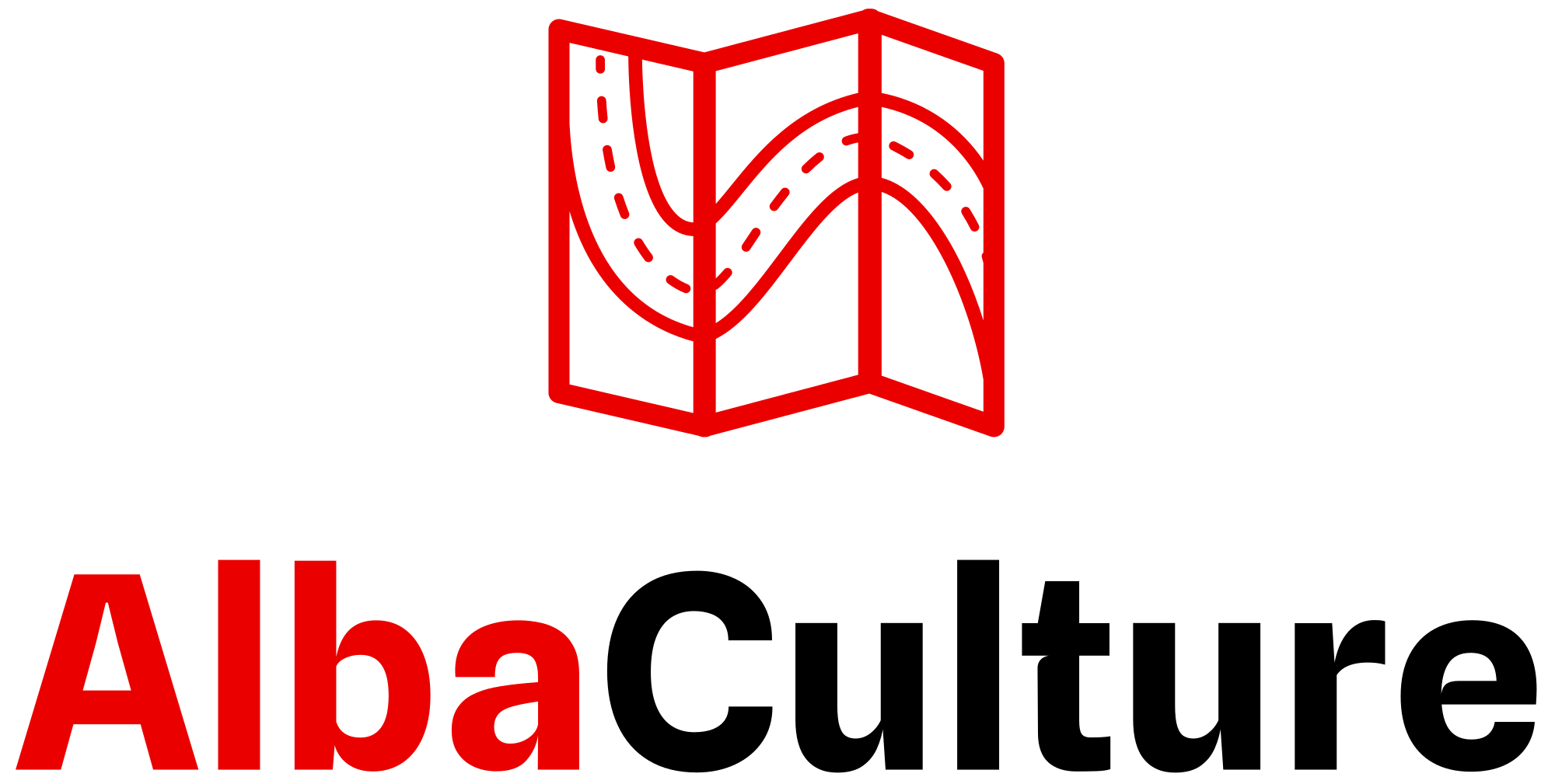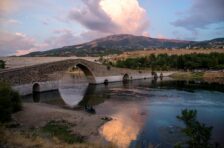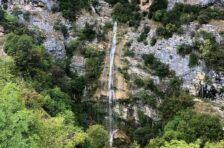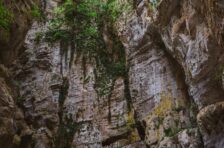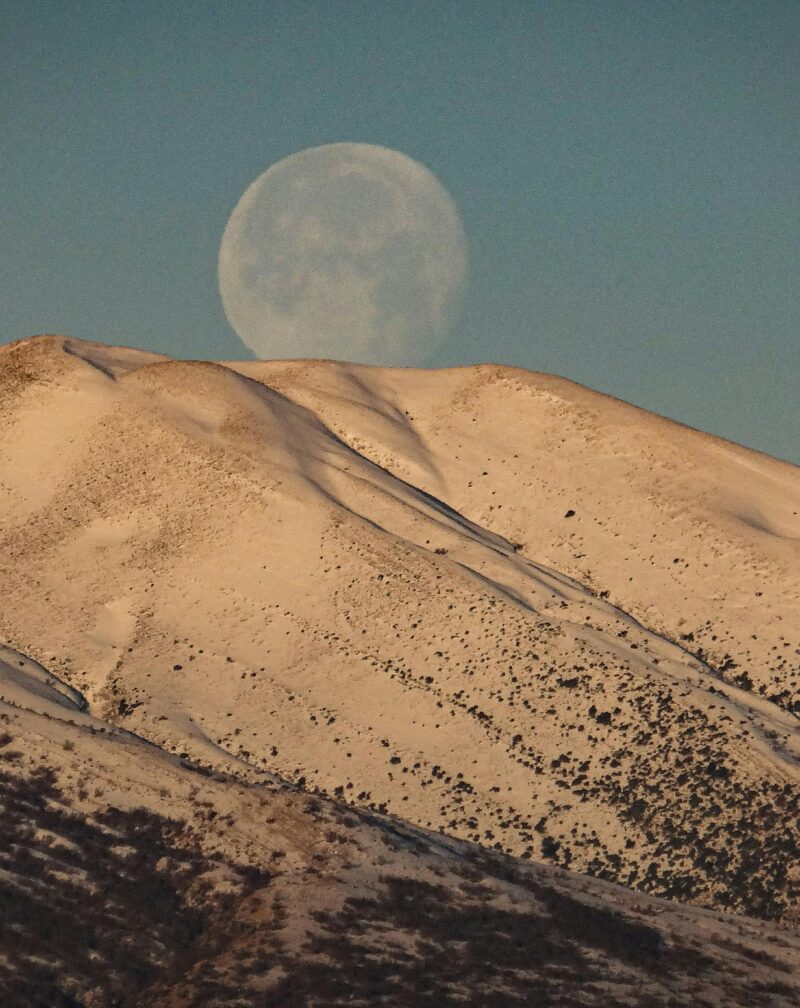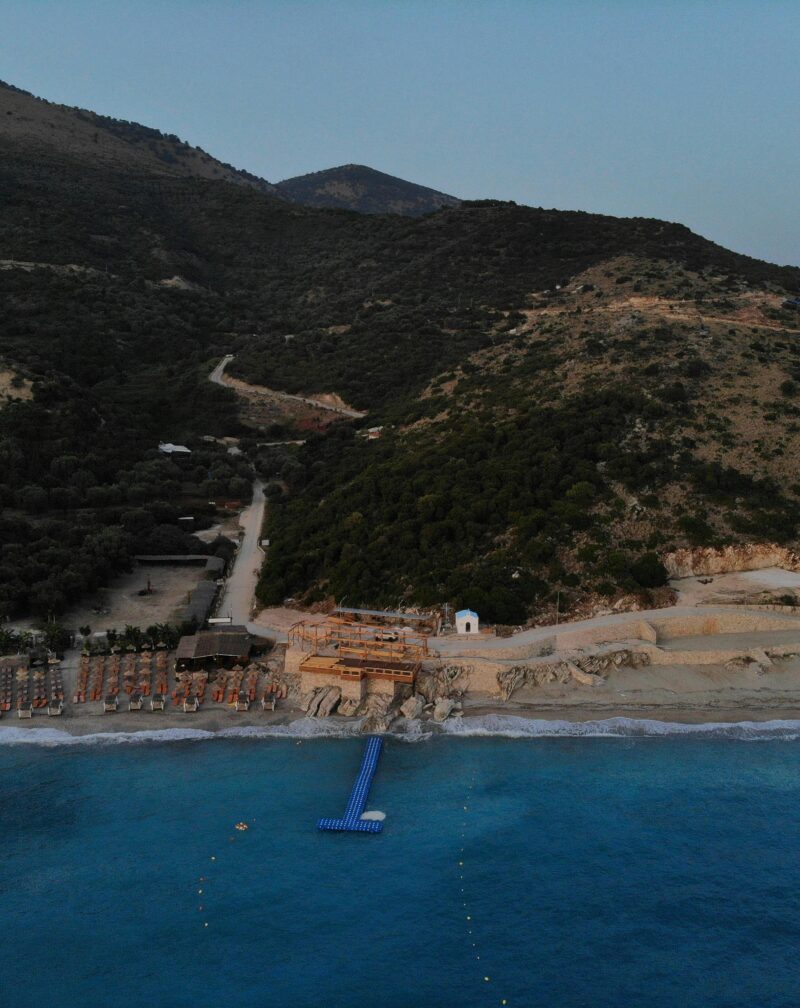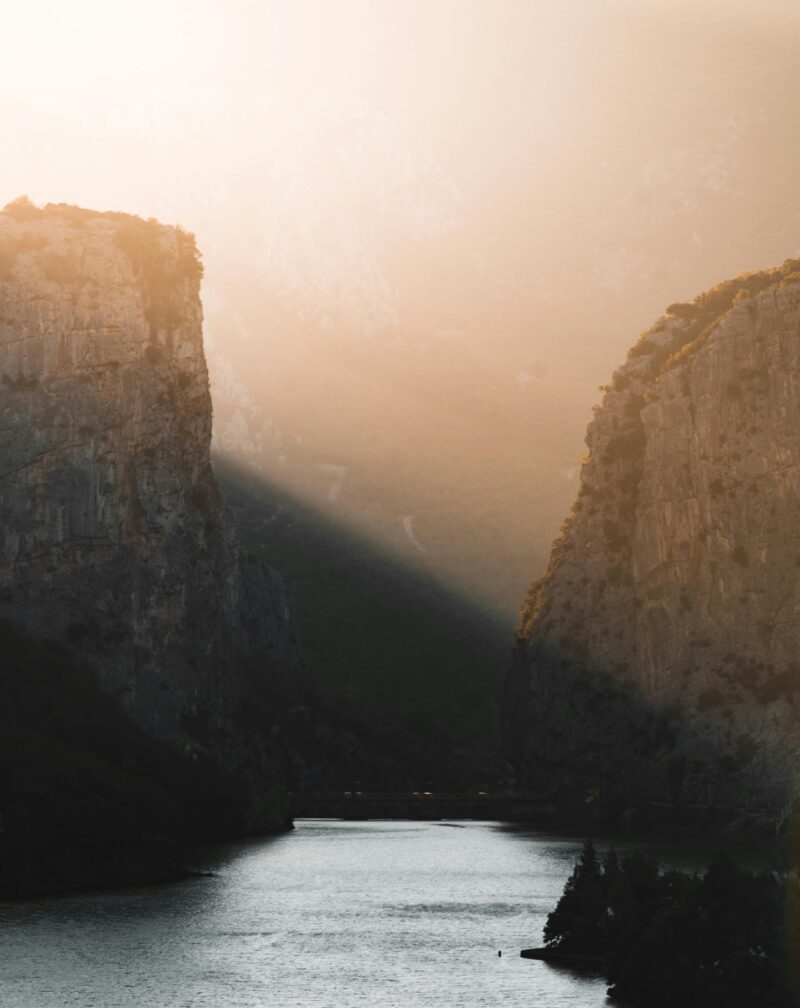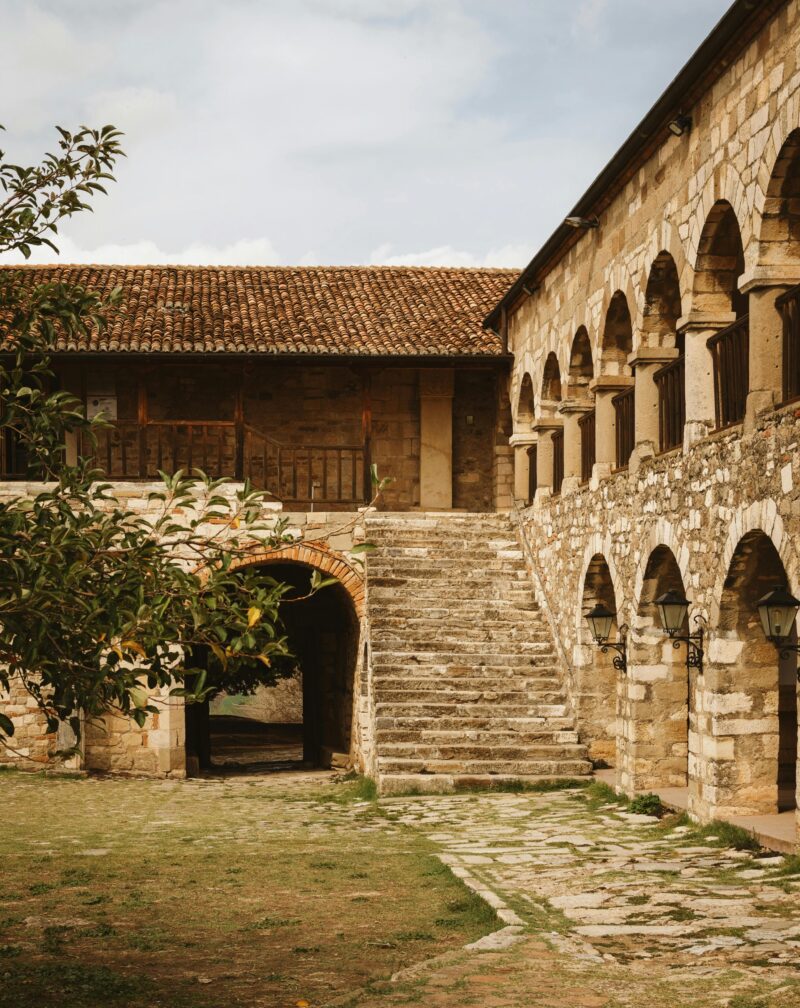Celebrating Albanian Culture
Albania’s festivals range from ancient traditions to modern cultural events. Some are major national celebrations, others small village affairs. Many aren’t heavily promoted to tourists but welcome visitors who show interest.
National Festivals
National Folklore Festival – Gjirokastër This is Albania’s premier cultural event, though it only happens every five years. The next one is scheduled for 2025.
Gjirokastër’s castle hosts performers from across Albania and Albanian diaspora communities. Traditional costumes, folk dances, iso-polyphonic singing, instruments like the çifteli and lahuta.
The festival lasts several days. Performances happen multiple times daily on outdoor stages. The castle setting is spectacular—ancient stone walls, views over the valley, traditional music echoing.
When the festival occurs, Gjirokastër becomes impossible to navigate normally. Hotels book months ahead. Restaurants overflow. The city’s population swells dramatically.
But it’s remarkable for anyone interested in traditional culture. You see regional variations in costume, dance, and music side by side. Older traditions that rarely appear publicly are performed.
If you’re planning to attend, book accommodation early—ideally six months or more in advance. Consider staying in nearby towns if Gjirokastër is fully booked.
Tirana International Film Festival is in Late November or early December typically. International and Albanian films screen across venues in Tirana.
The festival is growing in reputation, attracting filmmakers from across the Balkans and beyond. Red carpet events, Q&As with directors, parties.
For film enthusiasts, it offers access to Albanian cinema that rarely screens internationally. Albanian filmmaking has its own aesthetic shaped by the country’s unique history.
Tickets are reasonably priced. The atmosphere is more accessible than major European film festivals—you can actually meet directors and actors without layers of security and handlers.
Summer Day (Dita e Verës) March 14 celebrates spring’s arrival. This is ancient tradition, pre-dating Christianity and Islam, surviving as cultural rather than religious practice.
Families make traditional sweets called ballokume in Elbasan or other regional variations elsewhere. Children exchange small gifts. People spend time outdoors celebrating winter’s end.
It’s not organized event—more dispersed family celebrations. But you’ll notice activity in parks and public spaces. Markets sell traditional sweets.
Elbasan is the epicenter, with larger public celebrations. Other cities observe more quietly.
Independence and Liberation Days – November 28-29 Two consecutive national holidays. Independence Day (November 28) marks independence from Ottoman Empire in 1912. Liberation Day (November 29) commemorates liberation from German occupation in 1944.
Flags cover everything. Buildings, cars, shops—Albanian double-eagle flags everywhere. Military parades happen in major cities. Official ceremonies at monuments.
Tirana’s Skanderbeg Square hosts major celebrations. Concerts, speeches, crowds gathering. Smaller cities have local ceremonies.
It’s the peak national pride period. Good time to experience Albanian patriotism and history consciousness. But also means government offices, banks, and many shops close.
Regional and Religious Festivals
Catholic Easter – Various Dates Shkodër, the Catholic stronghold, celebrates Easter seriously. Churches hold services. Families gather for special meals. Traditional foods include lamb and special breads.
Saturday night Easter vigil is particularly important. Churches fill. Candles are lit. The atmosphere is reverent and beautiful.
For visitors interested in religious culture, attending Easter services in Shkodër provides insight into Albanian Catholicism’s resilience after communist suppression.
Orthodox Easter – Various Dates Celebrated about a week after Catholic Easter typically. Korçë and southern regions with Orthodox populations observe church services and family meals.
The tradition of cracking, red-dyed eggs (tsougrisma) happen. Families paint eggs, then compete cracking them against each other.
Less commercialized than Easter in Western countries. More focused on religious and family aspects.
Bayram (Eid al-Fitr) Marks end of Ramadan. Celebrated by Muslim Albanians with prayers, family meals, and sweets.
Albania’s Muslim observance is often moderate compared to stricter Islamic countries. Some families observe Ramadan fully, others partially, some not at all.
In areas with strong Muslim tradition, Bayram brings families together. Special foods are prepared. Children receive small gifts or money.
The exact date moves yearly based on the lunar calendar. Mosques hold special prayers. Public celebrations are modest but warm.
Kurban Bayram (Eid al-Adha) The larger Islamic festival, marked by animal sacrifice and distribution of meat to poor families.
In Albania, this maintains some traditional practice but adapted to modern context. Families might contribute to animal sacrifice collectively rather than each household doing it.
Larger celebration than Eid al-Fitr. Families gather. Traditional foods feature lamb or beef. The emphasis on charity and sharing remains central.
Local and Specialized Festivals
Beer Festival – Korçë Summer event celebrating Albania’s brewing tradition. Korçë Beer, Albania’s oldest brewery, hosts festival with beer tasting, music, food.
Local and international beers are available. Bands perform. Food stalls sell traditional dishes. The atmosphere is casual and fun, not formal.
Dates vary yearly, usually July or August. Check locally for specific timing.
Wine Festivals – Various Locations Several regions host wine festivals during or after harvest. Berat region, being Albania’s wine heartland, has celebrations in autumn.
These are often small local affairs rather than major tourist events. Winemakers showcase new vintages. Local food accompanies tastings. Music and dancing happen spontaneously.
The Çobo winery and others occasionally host open houses or festivals. Following Albanian wine social media or asking locally reveals these events since they’re not always formally advertised.
Cherry Festival – Permet Allows celebrating local cherry harvest, usually June. Permet’s cherries are regionally famous.
The festival includes a market with cherries and cherry products, food stalls, music, and traditional dancing.
It’s small-scale and authentically local. Don’t expect major production—think village celebration that welcomes visitors.
Honey Festivals Various regions known for honey host small festivals. Zagoria region and mountain areas sometimes have honey celebrations in late summer or autumn.
Beekeepers display different honey varieties—mountain, forest, flower honeys with distinct flavors. You can taste and purchase it directly from producers.
These are often single-day events, not heavily promoted. Asking at local tourism offices or hotels in honey-producing regions might reveal timing.
Carnival – Durrës Pre-Lenten carnival in Durrës has been reviving. Not as famous as Venice or Rio but growing.
Parades with costumes, music, dancing in streets. Families participate. It’s modest compared to famous carnivals but growing in scale and ambition.
Timing follows Christian calendar, so dates vary yearly, typically February or early March.
Literature Festivals Albania’s literary culture hosts occasional festivals. These appeal to niche audience—people interested in Albanian literature and poetry.
Events might include readings, discussions, book signings. Often in Albanian language, limiting accessibility for non-speakers, but the cultural atmosphere is interesting.
Tirana and Gjirokastër (tied to Ismail Kadare, Albania’s most famous writer) host these events occasionally.
Music Festivals Various music festivals have emerged, particularly in summer.
Kala Festival – Durrës Castle Electronic music festival in Durrës Castle, usually June or July. International DJs. Young crowd. Multi-day event.
This targets international attendees as much as Albanians. It’s grown significantly, attracting electronic music fans from across Europe.
Unum Festival – Shëngjin Another electronic/dance music festival on the coast. Similar vibe to Kala—beach, music, party atmosphere.
Dates vary but typically summer. Growing in popularity among European festival circuit followers.
Traditional Music Festivals Smaller festivals celebrating Albanian traditional music happen regionally. These maintain folk traditions rather than commercial entertainment.
Villages occasionally host celebrations featuring local musicians playing traditional instruments. These aren’t scheduled tourist events—they’re community celebrations that might coincide with your visit if you’re lucky.
Religious Pilgrimages
Kodra e Shkronjave (Writing Hill) – Shëngjin Catholic pilgrimage site where believers gather for special ceremonies. Associated with miraculous appearances and healings according to Catholic tradition.
Thousands attend during major religious dates. If you’re interested in religious phenomena and Albanian Catholic culture, it’s significant.
The site itself is simple—a hill with religious iconography. The significance is spiritual rather than architectural.
How to Find Local Events
Albania doesn’t have comprehensive online event calendars easily accessible in English. Finding local festivals requires:
- Asking hotel staff or guides about upcoming events
- Checking city tourism office websites or social media (often Albanian only)
- Following Albanian tourism Facebook pages
- Looking for posters in towns advertising events
- Simply being lucky and stumbling upon celebrations
Many Albanian festivals aren’t designed for tourists. They’re for locals. This makes them more authentic but harder to plan around.
If you encounter a festival during your visit, participate respectfully. Albanians generally welcome interested foreigners, especially at public celebrations. Dress appropriately (modest for religious events), ask permission before photographing people, and show genuine interest rather than treating it as a spectacle.
The lack of heavy tourism infrastructure around festivals means you experience them more naturally. You’re not viewing a show—you’re joining a celebration.



